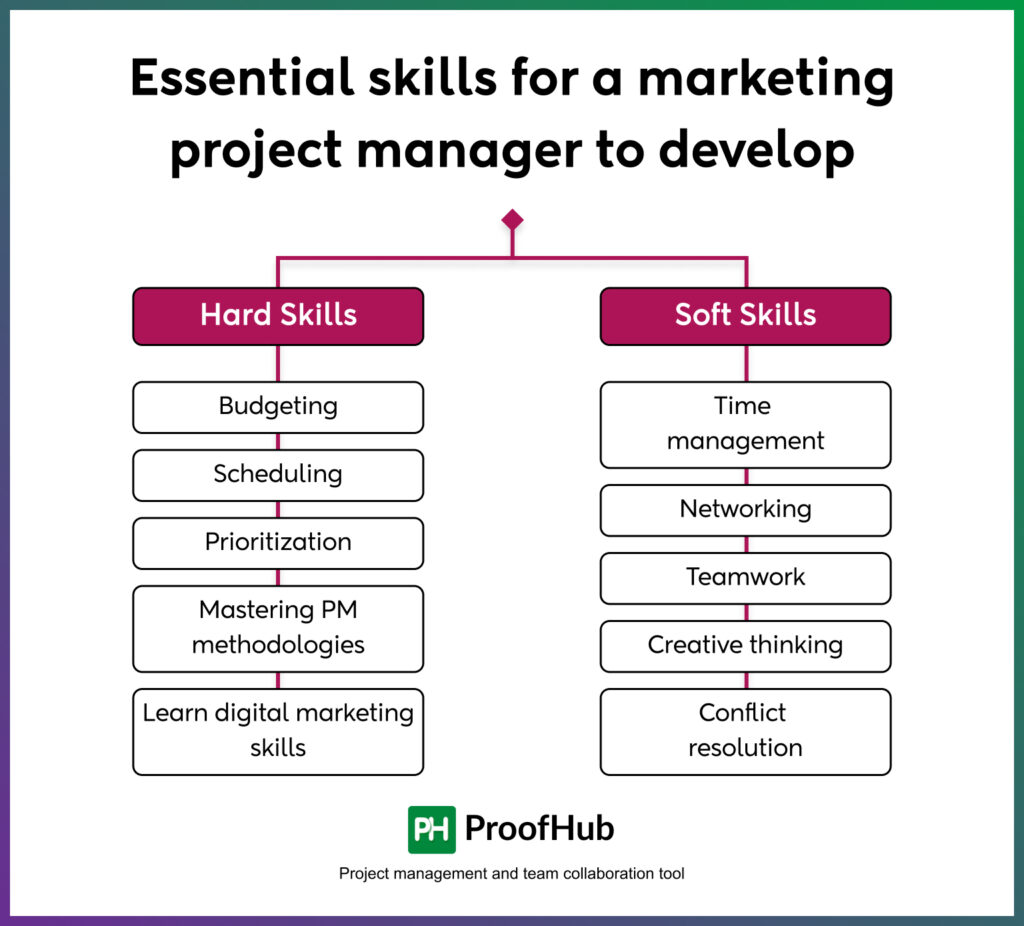“Never chase opportunities. Let it come to you by creating value and building rare skill sets.”― Johannes Larsson
It’s amazing how work processes have changed ever since the pandemic.
Nobody knows it better than marketing project managers who juggle a whole lot of responsibilities, hence enabling companies to deliver a desirable outcome.🏆
From project planning, managing, and execution to managing both in-office and remote team members, there is a list of marketing project manager skills that you need to navigate teams toward successful project completion.
In this article, we’ll focus on both new and seasoned marketing project managers, understand their job responsibilities, and how they can add some more indispensable skills to be better at what they do i.e. managing teams and projects.
What is the job role of a marketing project manager?🤔
Many people consider the job roles and responsibilities of a marketing project manager and project manager as the same, but there is a difference.
While project managers across various industries are responsible for overseeing projects of any type, the job role of a marketing project manager is strictly specific to the production of marketing and advertising campaigns.
In simple words, a marketing project manager defines and channelizes all marketing efforts for the organization. They are responsible for ensuring efficient project management (related to marketing campaigns) at every stage, from planning, and execution to the final delivery.
Marketing project managers often coordinate with marketing strategists to develop a marketing project plan that syncs with the creative vision of the marketing team.
Marketing project manager responsibilities and duties📋
The job role of a marketing project manager encompasses a bunch of different responsibilities and duties while driving the project’s progress from initiation to final delivery.
Following is the list of all crucial responsibilities and duties that are part and parcel of the all-encompassing job role of a marketing project manager.
- Plan, coordinate, and monitor a wide range of tasks and projects with cross-functional teams to ensure all goals and objectives were met within the allocated budget and schedule to the best possible quality standards.
- Communicate regularly with stakeholders and related resources and provide overall project alignment.
- Establish and communicate project strategy, priorities, and deliverables to cross-functional stakeholders to receive support and other resources.
- Create, organize, and update comprehensive project documentation like charts, instructions, tracking, logging, etc,
- Create and execute an effective internal communication strategy to keep all teams aligned and updated.
- Attain project milestones as scheduled and submit final materials on time.
- Accumulate required data from end users to evaluate KPIs, goals, objectives, and progress of a project.
- Develop, implement, monitor, and socialize new and/or existing processes that improve cross-functional alignment, effectiveness, and decision-making.
Ten critical marketing project manager Skills that you should start to work on
Whether you’re already a marketing project manager or aspiring to become one, there are some crucial marketing project manager skills you need to have to excel in this highly competitive and demanding job.💼
The most competent PMs in any industry are expected to have both hard skills and soft skills, which can be learned and developed through self-learning, training opportunities, tools, checklists, etc.

Let’s explore further. 👇
1. Hard Skills (technical and measurable)
Hard marketing project manager skills are those that you learn and develop through professional training, work experience, or education. Such skills can often be taught and easily proven. You may already have important hard skills, but not all are considered management skills.
Here are some essential hard project manager skills for managers:
1) Budgeting
Budget is a critical component of marketing projects. It’s the marketing project manager’s responsibility to ensure that the project is completed on time without exceeding the allocated budget. Solid budgeting requires a good understanding of math, financing, and spreadsheets.
A marketing project manager with exceptional budgeting skills can forecast expenses in advance to reach the target ROI. When you create and plan any project, prepare your budget on realistic scoping and understand the actual costs in time.
Here are some budgeting skills necessary for marketing project managers:
- Budget preparation
- Budget tracking
- Accounting
- Financial analysis and forecasting
2) Scheduling
Scheduling determines the workflow of your team. Scheduling ensures that both marketing project managers and their teams are clear on how events, tasks, and milestones are scheduled, so they can manage work accordingly. Having smart scheduling marketing project manager skills eliminates the possibility of overstaffing and under-staffing while helping to bring down unnecessary costs.💰
Managers need to ensure that nothing important is missed by setting automatic reminders, creating recurring tasks, and having multiple views of your calendars. Using a highly functional marketing project management software like ProofHub, with an inbuilt scheduling tool, can help you and your team to stay in sync with all your important tasks, events, and milestones.
Managers can have a Bird’s eye view of all calendars without having to jump through projects.
3) Prioritization and goal-setting
Managing multiple projects simultaneously involves tackling a plethora of tasks. However, these tasks differ from each other in terms of priority. Not all of them are supposed to be attempted at the same time.
Therefore, a competent marketing manager organizes and prioritizes all tasks so every team member works on the right task at the right time. It ensures your team members do not spend valuable time on low-priority tasks.
The marketing project manager skills include making priorities clear to people and connecting these to both long-term and short-term team goals. Goals are important for both employee and company growth as they provide focus, direction, focus, and clarity.
Never miss out anything important with ProofHub. Book your Demo now
4) Mastering project management methodologies
Today, project managers cannot rely on traditional waterfall project management methodology where projects are managed in a sequential cycle. Dynamic work environment requires project managers to be apt in both traditional and Agile methodologies with an interactive input system of continuous delivery and feedback to involve customers in the whole process.
Teams need to have a clear view of what they are currently working on, what has been accomplished, and what they’ll be working on next. Kanban Boards can help marketing project managers to view the current stage of tasks and identify potential bottlenecks in time.
On the other hand, teams can self-manage with a better understanding of workflows as they get notified of tasks moving from one stage to another.
5) Learn digital marketing skills
In this digital age, most marketing projects and campaigns are created and implemented keeping in view the latest digital marketing trends and practices. As a savvy marketing project manager, you need to have a strong hold over digital marketing skills like search engine optimization (SEO), video, content marketing, and social media tactics.
You’ll need to analyze data to understand what works well and what does not. However, you should not abandon traditional marketing channels. Some customers still prefer face-to-face, direct selling, or paid advertising to buy your products or services.
2. Soft Skills (people and personality)
Soft marketing project manager skills are your innate, transferable skills that include how you interact with other people, handle different situations, and how you organize your work. Your technical prowess and soft skills are different, but both combine to help you deal with different people and varying situations. You can further enhance and develop your soft skills over time.
6) Time management
Smart time management is one of the integral marketing project manager skills. You need to make sure that you and your team are utilizing available time on the job, which will further lead to increased productivity and efficiency. Cutting down time wastage helps organizations save money while registering healthy revenue figures.
To achieve this, managers should use an efficient time tracking tool that helps them to create accurate, data-based time reports to analyze how and on what tasks people are spending their time on.
A good time-tracking tool will help you and your team to:
- Track time spent on different tasks manually or by using automatic timers.
- Set time estimates for tasks to know whether it was completed within a specified time frame or not.
- Set the start and due dates for tasks to add clarity.
- Use timesheets for payroll, client billing, estimation, and tracking.
- Create custom time reports of people and projects.
7) Networking
Networking is counted among important marketing project manager skills in today’s competitive environment.
Herminia Ibarra, INSEAD Professor of Organizational Behavior says, “Your professional relationships give you an edge, allow you to augment your knowledge, and effectively translate it into practice for the organizational benefit. It makes all the difference.”
For marketing project managers, three types of networks are crucial:
- Personal. Includes a diverse group of like-minded professionals
- Operational. Involves fostering the relationship with other professionals you need to accomplish your job
- Strategic. Building and maintaining relationships with colleagues and senior executives in your field
If you want to succeed, you need to devote your valuable time to building a strong network of professionals from the same and diverse industries. Remember, it’s not the quantity but the quality of your contacts and how you use them that matters.
8) Teamwork🤝
54% of employees say a strong sense of community (great coworkers, celebrating milestones, a common mission) kept them at a company longer than was in their best interest.
No surprise that employees (including managers and other senior-level executives) with strong teamwork skills are preferred by employers as the former demonstrate good collaboration, leadership, and communication skills.
No matter how capable a marketing project manager you are, you cannot drive your projects (and organization) to success all by yourself. You need to coordinate well with your team members and get the best out of them while developing mutual trust and respect.
9) Creative thinking
Through survey-based research, IBM discovered that creativity is deemed the most important leadership quality among leaders themselves.
An effective marketing project manager needs to be creative and think outside the box. Being creative helps managers foster a congenial, healthy workplace environment. Creative thinking enables managers to bring new perspectives to the workplace and discover new ways for problem-solving, achieving goals, and motivating teams.
- Creative thinking can involve:
- A unique approach to a problem
- A resolution to employee conflicts
- A new result from a data set
- A never-before tried approach to earning revenue
- A new product feature, or product
Some top creative thinking skills that managers should learn and develop in today’s highly competitive business environment are:
- Analytical thinking – Ability to analyze things first
- Open-minded – Coming up with things that were never thought of before
- Problem-solving – Ability to solve an important issue
- Organization – Fix clear goals and deadlines
- Communication – Strong written and verbal skills, active listening, asking the right questions
10) Conflict resolution
With workplaces composed of people from diverse backgrounds, thought processes, and personality traits, workplace conflicts are a common occurrence. However, such conflicts mustn’t be allowed to negatively impact the organizational workflow, productivity, and revenue figures. This is where a manager’s conflict resolution skills play a vital role in timely resolving disputes in their bud.
For managers, conflict management is tricky, and it calls for the ability to tackle issues firmly, with a high degree of empathy and sensitivity.
Here are some skills that’ll help develop your conflict management expertise:
- Communication – Listening, body language, monitoring
- Stress management – Manage team stress, motivating employees
- Problem-solving – Identifying issues, listening, coming up with solutions
- Emotional intelligence – Self-awareness, self-management, social awareness, relationship management
- Teamwork – Define individual goals, set team goals, and meet with team members
The final thought💭
Organizations and people have a lot of expectations from managers. Managing complex projects requires marketing project managers to have a wide range of soft and hard skills to ensure timely project completion through smart resource allocation.
While managers always need to be on top of their game in today’s thriving business environment, developing new skills will help them efficiently manage both teams and projects.
ProofHub, a powerful project management and team collaboration software, is just the right tool for marketing project managers to achieve the most out of their resources through immaculate planning, collaboration, and delivery of projects.😉
FAQs:
What makes a great marketing project manager?
A great marketing project manager knows how to drive others to success, utilize their skills & personality traits, without disrupting individual team members
What skills can be essential for marketing project managers?
Marketing project managers need to be good at organizing, analyzing, prioritizing, communicating, and steer collective efforts of people to achieve set goals
What are the three key responsibilities of a marketing manager?
Three key responsibilities of a marketing manager are:
-Supervise all marketing campaigns for their company or department.
-Execute strategies.
-Ensure the organization is delivering the right messaging to draw in prospective customers and retain existing ones.

